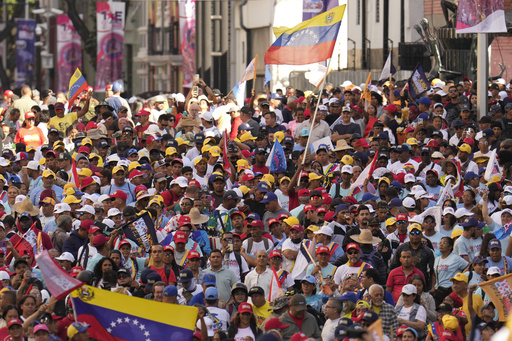CARACAS, Venezuela — On Friday, Nicolás Maduro was officially sworn in for a third consecutive six-year term amidst widespread international outcry that deemed his recent reelection illegitimate. As his administration continues to intensify crackdowns on dissenters, the atmosphere around the inauguration was marked by a heavy police presence at the legislative palace, which was flanked by military and intelligence personnel. Supporters of Maduro filled the streets nearby, many wearing T-shirts emblazoned with pro-Maduro slogans.
In the United States, President Joe Biden addressed his decision to refrain from imposing stricter sanctions on Venezuela’s energy sector, expressing concerns that such a move might benefit Iranian oil interests instead. While the Biden administration has sanctioned certain individuals within Maduro’s circle, it has also maintained a license for Chevron, allowing them to export Venezuelan oil, which has in turn led to an increase in oil production and revenue for the Maduro government. Responding to inquiries regarding the effectiveness of sanctions, Biden mentioned investigations into the potential consequences of additional energy sanctions but noted that he may consider stronger actions before his presidential term concludes on January 20th.
Edmundo González, a former presidential candidate and opposition leader, proclaimed himself the president-elect of Venezuela in a video message from the Dominican Republic. In his address, he thanked international allies for their support and highlighted newly imposed sanctions against Maduro’s government. He expressed readiness to return to Venezuela when conditions allow and urged the military to reject what he termed “illegal orders” from Maduro, openly calling the president a dictator lacking popular support.
Meanwhile, leaders from the G7 nations and the European Union jointly condemned the perceived lack of democratic legitimacy in Venezuela’s elections and the ongoing repression under Maduro’s administration. In South America, Argentina and Chile also issued statements denouncing Maduro’s presidency as fraudulent. Additionally, Venezuela announced the closure of its border with Brazil, a decision that follows a similar measure taken against Colombia earlier in the day amid fears of unrest.
The atmosphere in Caracas appeared bleak, with limited vehicular movement and numerous shops shuttered following the inauguration. Citizens expressed a pervasive sense of disappointment and uncertainty regarding their future. One resident described the city as feeling “like a ghost town,” reflecting the overall state of disillusionment that many Venezuelans grappled with after a long wait for change leading up to the presidential election.
In a striking condemnation, opposition leader María Corina Machado characterized Maduro’s inauguration as a “coup.” She advised González not to return to Venezuela until the political climate became more favorable, walking back a previous assertion that he would assume control from Maduro. In her message to supporters, she encouraged continued resistance against Maduro’s regime, stating that the pressure on the president would intensify. Machado provided little detail regarding specific strategies but assured her followers that liberty was within reach.
During Maduro’s inaugural speech, he maintained that his governance adhered to the constitution, despite counterclaims of election fraud. In his address, he criticized the United States and other foreign adversaries, asserting that their attempts to undermine his authority had failed. Amidst the celebrations of his inauguration, various leaders from allied nations attended, including representatives from Cuba and Nicaragua, both of which face their respective allegations of human rights violations.
In a gesture of solidarity towards Venezuelans fleeing the country, the Biden administration announced an extension of temporary legal status for approximately 600,000 Venezuelan nationals living in the U.S. This follows a period of heightened scrutiny and criticism directed at Maduro, who has faced significant pushback from international powers regarding his electoral legitimacy.
The United Kingdom and Canada also imposed new sanctions targeting senior Venezuelan officials as condemnation of Maduro’s election continued to mount. The U.K. specifically highlighted the illegitimacy of Maduro’s claim to power. This coordinated response among Western nations illustrates a growing call for accountability regarding human rights abuses and respect for democratic processes in Venezuela.
As Maduro’s government proceeds with its agenda, a coalition of Venezuelan opposition parties vowed to continue fighting against what they termed a “coup d’état” against democratic ideals. They expressed their commitment to democratic resistance until fundamental rights are restored and the actual will of the people is acknowledged.
Overall, the climate in Venezuela remains tense, and with growing internal and external pressures, the future of Maduro’s governance continues to hang in the balance as voices of opposition seek to challenge his authority.
As Maduro finds himself increasingly isolated on the international stage yet buoyed by domestic support, his administration faces the daunting task of navigating both amplified sanctions and the persistent demands of the opposition for genuine political transformation in a country yearning for change.



